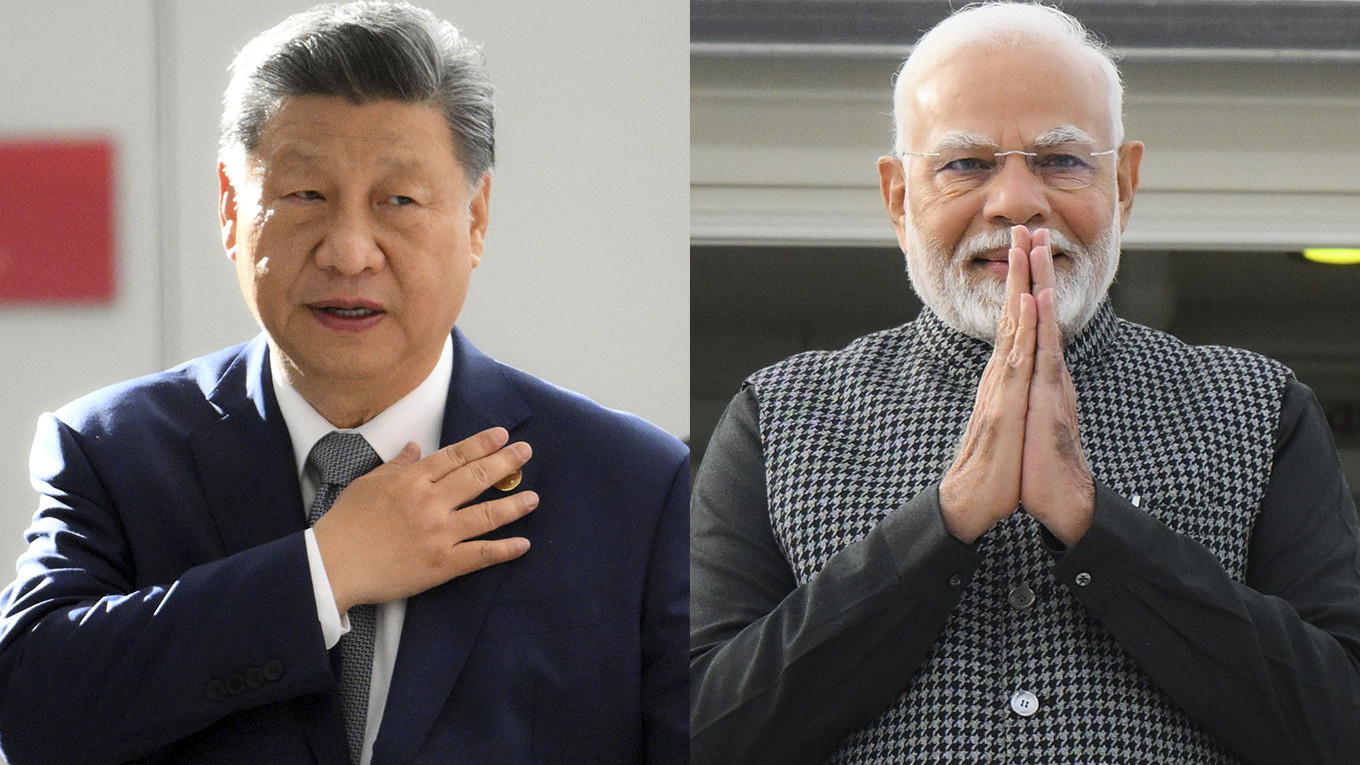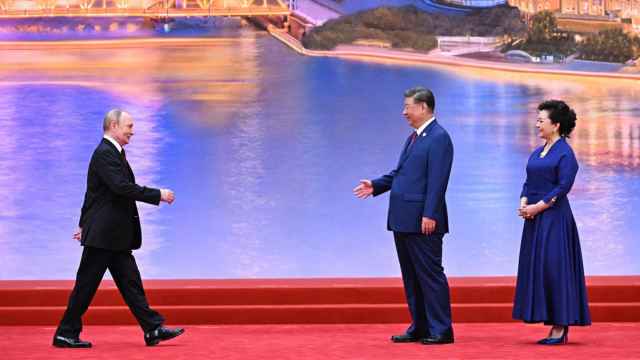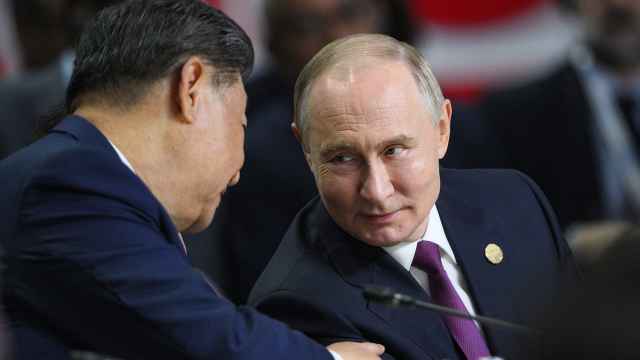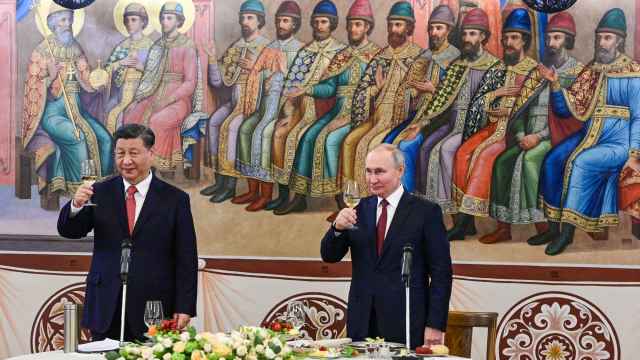Moscow has long seen India and China as key players in its vision of a multipolar world. But recent events are pushing Beijing and New Delhi closer together, threatening to leave Russia on the sidelines.
United States President Donald Trump’s failure to make good on his signature campaign promise to swiftly end the Russo-Ukrainian war has seen him lash out at India — a supposed strategic Western partner — for not caring about the people being killed in Ukraine. According to American officials, India is a “Kremlin laundromat,” not least since Russia’s share of total Indian energy imports surged from a measly 3% back in 2021 to 42% at present. Trade adviser Peter Navarro even said that “the road to peace runs through New Delhi,” knowing full well that if this is indeed the case, then the highway to peace almost certainly passes through Beijing.
The problem is that punishing both China and India risks cultivating mutual resentment toward the U.S. while turbocharging their reconciliation. As such, the Trump administration ended up levying extortionate 50% tariffs on most Indian goods earlier this week, whereas China was effectively given a pass despite not just purchasing larger quantities of discounted Russian crude and liquified natural gas (LNG) but also providing Moscow with 80% of critical dual-use components needed to prosecute its war. Worse still, Chinese Foreign Minister Wang Yi made clear which side his country is rooting for when he reportedly informed EU High Representative Kaja Kallas last month that “Russia cannot be allowed to lose the war against Ukraine.”
India, on the other hand, has adopted a comparatively nuanced stance for the sake of staying true to its decades-old nonalignment doctrine. Indian Prime Minister Narendra Modi even told President Putin that “this is not an era of war” during their September 2022 meeting in Samarkand. Unlike Xi, Modi actually travelled to Kyiv a year ago to demonstrate that India has no dog in the Russia-Ukraine fight.
Yet, for good reason, Trump concluded that making an example of India would serve as a warning shot to Beijing without incurring significant damage or blowback to the American economy. After all, China boasts a nominal gross domestic product (GDP) roughly five times that of its southern neighbor and an abundance of rare earth minerals and precious metals — not to mention a $361 billion trade surplus with the United States.
Incidentally, Washington’s apprehension about driving both nuclear-armed arch-foes into each other’s arms is shared by the Kremlin. Granted, Russian Foreign Affairs Minister Sergey Lavrov recently expressed hope that the split between the West and the Global South would breathe new life into the Primakov Triangle — a three-way alliance between Russia, India and China to counterbalance the U.S.
But New Delhi and Beijing were never as enthusiastic about this alignment as Moscow. Chinese Communist Party (CCP) and the Modi government that they are far better off ironing out their differences bilaterally, rather than relying on third-party intervention or oversight. The goodwill Russia has built playing peacemaker over the past five years no longer holds sway.
At the same time, Russian-dominated organisations like BRICS and the Shanghai Cooperation Organisation (SCO) would become increasingly futile in the eyes of the Chinese and Indian elite, whose rapidly growing nations are the real locomotives behind the new world order Russia has positioned itself at the forefront of.
Admittedly, the formal tête-à-tête Xi Jinping and Modi held in Kazan last October at Putin’s behest helped galvanise the ongoing peace process. Although the Kremlin is still looked upon as an honest broker within the context of Sino-Indian rapprochement, Wang Yi’s official visit to New Delhi in mid-August proved that Moscow’s good offices are not indispensable for further dialogue to take place. Likewise, Modi’s confirmed attendance at this week’s SCO Summit in Tianjin — marking his first trip to China in seven years — speaks volumes about how wedded the Asian giants are to an organic diplomatic reset following their deadly 2020 border skirmish. Moreover, the Chinese leader and his Indian counterpart appear to have put aside the petty rivalry that saw them skip previous BRICS, SCO and G20 conferences to avoid ego clashes and upstaging one another.
Russia has long been a major beneficiary of New Delhi’s adversarial relationship with Beijing. According to the Stockholm International Peace Research Institute (SIPRI), India was the world’s second-largest arms importer from 2020-24, with Russian-made weaponry accounting for 36% of its overall purchases. The same paper attributed India’s record military expenditure to the two-pronged threat it faces from China and Pakistan.
Of particular concern to Moscow is that the Indian Ministry of Defence had begun procuring hardware from alternative suppliers like France and Israel well before the full-scale invasion of Ukraine was launched. Judging by New Delhi’s current direction of travel and Beijing’s insistence on “a cooperative pas de deux of the dragon and the elephant,” there is a strong possibility that India could soon start sourcing advanced armaments from China to complement its indigenous production capabilities at Russia’s expense.
This is especially the case given the delayed delivery of Russian S-400 air defence systems to India, coupled with Chinese-manufactured fighter jets and air-to-air missiles successfully downing five Indian-deployed warplanes during the four-day Indo-Pakistan conflagration in May. Beyond cheap commodities, weapons deals, space exploration and nuclear energy collaboration, India has historically entrusted Russia with reining in China’s People’s Liberation Army and keeping a lid on Beijing’s expansionist ambitions. By virtue of being sanctioned to the hilt for its invasion of Ukraine and reduced to a mere junior partner in its “no limits” agreement with China, the Kremlin’s credibility as a de facto guarantor of stability across South and East Asia is fast eroding.
If anything, the Russian Federation’s quest to stay relevant and command respect from New Delhi as well as its Chinese paymasters hinges on Sino-Indian interstate relations being plagued by friction and suspicion. Notwithstanding their unresolved territorial dispute, disparate governance structures and conflicting views on Tibetan separatism, China and India understand that Moscow’s eastward pivot is little more than a knee-jerk reaction to its continued isolation from the West. The CCP, in particular, is acutely aware of MAGA’s grand plans to pull off a reverse Kissinger by peeling white, Christian Russia away from public enemy number one, China. Trump himself acknowledged that Russia’s expulsion from the G7 bloc was a mistake and has already made a series of overtures aimed at luring it back into the Western fold.
The Chinese and Indians are doubtless bracing themselves for the prospect of Moscow actually taking the bait in light of the sheer economic strain it is under, not to mention compromised internal security, demographic challenges and a spike in domestic crime.
Having been alienated by the United States and made to second-guess whether their strategic alliances with the Kremlin are here to stay, the only viable path forward for China and India is to intensify direct engagement in pursuit of a stable, prosperous neighborhood.
Assuming such an eventuality comes to pass, Russia could find itself bereft of any remaining leverage over these regional rivals and even more cut off from the international community at large.
A Message from The Moscow Times:
Dear readers,
We are facing unprecedented challenges. Russia's Prosecutor General's Office has designated The Moscow Times as an "undesirable" organization, criminalizing our work and putting our staff at risk of prosecution. This follows our earlier unjust labeling as a "foreign agent."
These actions are direct attempts to silence independent journalism in Russia. The authorities claim our work "discredits the decisions of the Russian leadership." We see things differently: we strive to provide accurate, unbiased reporting on Russia.
We, the journalists of The Moscow Times, refuse to be silenced. But to continue our work, we need your help.
Your support, no matter how small, makes a world of difference. If you can, please support us monthly starting from just $2. It's quick to set up, and every contribution makes a significant impact.
By supporting The Moscow Times, you're defending open, independent journalism in the face of repression. Thank you for standing with us.
Remind me later.






